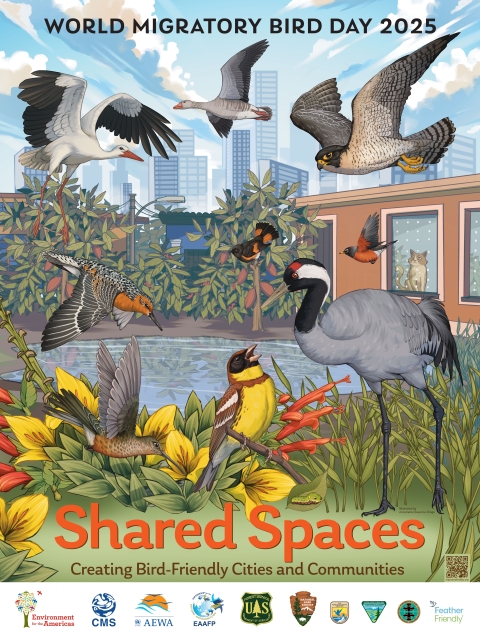WORLD MIGRATORY BIRD DAY
World Migratory Bird Day (WMBD) occurs every year on the second Saturday of May in the northern hemisphere and the second Saturday in October in the southern hemisphere. The campaign is a joint effort of the Convention on the Conservation of Migratory Species of Wild Animals (CMS), t he African-Eurasian Migratory Waterbird AGreement (AEWA), Environment for the Americas and the EAAFP. The addition of the EAAFP to this Partnership will strengthen engagement and awareness for migratory birds in the East Asian-Australasian Flyway.
Each year brings a special focus for WMBD. In 2023, the first year that Evanston participated in the program, the focus was on migratory birds and water. In 2024, the focus is on birds and insects.
From the WMBD website:
"The decline in the global insect popularion has enormous consequences for migratory birds. Insects are essential sources of energy for many migratory birds species, not only dudring the breeding season but also during their extensive journeys and greatly affects the timing, duration and overall success of bird migrations.
Along their migration routes, birds actively seek out insects in fields, forests, wetlands, and various habitats during stopovers. The timing of bird migration often coincides with peak insect abundance at stopover locations, supplying nourishment for birds to replenish their energy reserves before continuing their journeys. The loss and disturbance of insect populations at breeding sites and along avian migration routs threaten bird survival and well-being. Natural spaces like forests and grasslands that have been transformed or endangered by intensive agriculture and urban development and its effects such as light pollution can result in a decline in insect populations. Pesticides and herbicides designed to protect crops harm insects that birds rely on for food. A scarcity of energy-and protein-rich insects can hinder bird migration and breeding, leading to weakened immune systems, reduced reproductive success, and increased mortality rates for both adult birds and their offspring.
Birds play crucial roles in pollination and pest control, and a lack of insects disrupts these ecosystem functions. Overpopulation of certain insects, without natural predators from birds, can also causse outbreaks that damage plant health and agriculture."
Evanston has been a Bird City Illinois since 2023. All Bird City Illinois cities are required to write a proclamation declaring WMBD by the City Council, as well as presenting programs that celebrate migratory birds and suggest how people can appreciate birds and, in 2025, how they can improve Evanston's habitat so birds can flourish.
World Migratory Bird Day is Saturday, May 10, 2025.
Mayor Daniel Biss will read the Proclamation at a City Council meeting.
ENSBC's programs recognizing the day:
Saturday, May 10, Spring Bird Count walk. Meet at 7:30 a.m. in the Ladd Arboretum parking lot, 2024 McCormick Blvd. Leader: Libby Hill. Please register with libbyhill@comcast.net.
Sunday, May 11, Drawing With The Field With Peggy Macnamara

